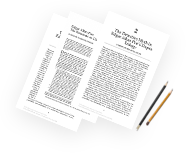See attached
REPLIES INSTRUCTIONS:
You will reply to 2 classmates. Every reply should meet the word requirements on the rubric 300 words Minimum and should advance the conversation further by providing new ideas and insights, asking probing questions that get to the heart of critical issues, and share from one’s personal and professional experience.
For the purposes of citations, every reply must
include:
o A minimum of 3 references (per reply)
o At least 2 of the 3 references from a scholarly article
o At least 1 of the 3 references from a relevant business article (any article from a reputable business source—website, magazine, book, etc.—that discusses a
relevant business/ethical issue)
Remember to provide new ideas, research, and analysis that create a clear dialogue with your classmate’s ideas. Go beyond providing basic definitions to topics being discussed—that is information that should have been provided in the original post. Your replies should not read as just another thread, nor should it merely regurgitate and restate what your classmate has said, or what you said in your own thread from the week before,
John S. Discussion 1
Discussion Thread: What is Competitive Intelligence? Why is it important to the public affairs function
Competitive intelligence (CI) is an organization’s ability to collect analyze and manage information on its competitors for their benefit. Any information that can be helpful to better understand the market and competition is considered competitive intelligence. Competitive intelligence is also used in organizations to forecast strategies, research, and marketing. A recent study has explained that there is an ever-increasing amount of misinformation that needs to be sifted through in today’s search for competitive advantage. They have also found that there are multiple definitions and understandings of competitive intelligence which makes it hard for the student and business realms to distinguish a clear understanding. It is believed that a scientific approach to better define (CI) needs to be taken in the future (Argyris, 2021). Just as a business is ever evolving, so are the boundaries and terms for gaining competitive advantage. In this week’s reading, we learned that caution needs to be taken when considering the type of information sought. They are legal and ethical boundaries that must be maintained when attempting to gain knowledge about competitors. Due to intellectual property and knowledge having physical value attempting to obtain set knowledge can be looked at as stealing. There is also ethical guidelines provided to professionals of (CI) written by the Strategic and Competitive Intelligence Professionals organization. An effective way to portray good ethics is by being honest. In Matthew 7:12 it says, “Therefore all things whatsoever ye would that men should do to you, do ye even so to them: for this is the law and the prophets” (KJB). Another similar phrase that I have seen used in the business world is, “Do unto others so they will do something good back unto you.” Although this may sound a bit manipulative, it gives an organization a good reason to provide a service in return.
In today’s day and age most, large organizations have adopted social mobile analytics cloud-based systems and strategies. One of the known successful ways to gather this information has been through social media-based analysis of text. This method is called “text mining” and has shown enormous success when implemented within organizations. Understanding and implementing CI within major organizations has still not been fully adopted. This study has shown that the process of gathering CI within large organizations has typically been labeled as market intelligence. There is still much to learn about competitive intelligence (Ranjan2022).
Luke Smith Discussion 2
Discussion Thread: Compare and contrast ethical egoist behavior with altruism. Discuss the issues that arise when a manager exhibits these traits in an organization?
Corporate Responsibility poses various questions worth considering. Of these questions, the comparison between ethical egoist behavior and altruism, along with the arising issues from exhibiting these traits are significant. Ethical egoism calls for individuals to act in their own self-interest, suggesting they put themselves above others. Chapter 5 confirms, “Self-promotion, a focus on self-interest to the point of selfishness, and greed are traits commonly observed in an ethical egoist” (Lawrence & Weber, 2023, p. 66). Individuals are solely motivated by self-promotion. Contrary to this behavior, altruism involves the opposite of self-interest. Lawrence and Weber define this term as “acting for the benefit of others when self-interest is sacrificed” (Lawrence & Weber, 2023, p. 66). This concept considers the benefit of others, expecting nothing in return. Instead, these individuals find motivation from a moral obligation to show empathy.
Ofori-Parku references altruistic companies such as the Social Venture Network and Green America (Ofori-Parku, 2021, p. 7). These companies all share one common interest: public benefit. Patagonia also values others and the impact its production has on the environment. Ofori-Parku confirms, “Another example is the outerwear and sports equipment company Patagonia. This firm is unabashedly environmentally minded and, at the same time, a profitable business” (Ofori-Parku, 2021, p. 7). Because of Patagonia’s moral obligation, a surge in profit was manifested. Managers found higher profitability and faster stock growth than its contestants.
Scripture supports altruism and explains Patagonia’s success by reading, “Give, and you will receive gifts-the full measure, compacted, shaken together and overflowing, will be put right in your lap. For the measure with which you measure out will be used to measure back to you” (Stern, 1998, Luke 6:38). Focusing on the benefit of others is both commanded and rewarded by God. When companies, value the public over self-seeking profitability, they are commonly rewarded.
Comparison Between Ethical Egoist Behavior and Altruism
There are three distinctions between ethical egoist behavior and altruism. First, ethical and altruism have motivational differences. Ethical egoism is fueled by self-interest, while altruism is motivated by concern for others. Chapter 5 confirms, “A manager or employee who puts his or her own self-interest above all other considerations is called an ethical egoist” (Lawrence & Weber, 2023, p. 66). This “self-interest” leads to the second distinction which is ethical egoism prioritizes individual welfares, while altruism prioritizes the impact made on others. Using organizational examples, Barghouti et al. show evidence that “Behaviors based on generosity and helpfulness lead to the creation of interpersonal relationships based on mutual trust. Also, these behaviors tend to improve health and longevity, as well as social integration within companies” (Barghouti et al., 2022, p. 4). Improved health and longevity are a result of emphasizing others over self. This emphasis marks the third distinction, when comparing both ideologies.
Arising Issues from Exhibiting These Traits in An Organization
Issues arising from these traits are found primarily from ethical egoism. These issues are ethical dilemmas, low employee morale, and negative stakeholder relations. Concerning altruism, there are few, if any, issues that arise within the workplace. Altruism brings benefits, rather than dilemmas.
Scripture reads, “Do nothing out of rivalry or vanity; but, in humility, regard each other as better than yourselves” (Stern, 1998, Philippians 2:3). When others are considered, organizations enjoy low turnover and long-term sustainability. Barghouti et al. verifies,
An altruistic environment in the organization seems to be linked to certain behaviors, feelings and organizational processes which may improve firm performance. In fact, some empirical works have shown a positive relationship between organizational citizenship behavior (OCB)––which involves altruism in organizations––and organizational performance. (Barghouti et al., 2022, p. 6)
Improved organization performance, supported by both scholars and scripture, is a byproduct of altruistic behaviors. From this support and business analyses, it is safe to say ethical egoism is the less desirable concept.
Conclusion
After comparing ethical egoism and altruism, reviewing business examples, and considering scripture, it can be said managers who consider others more valuable than themselves find success. Rather than placing oneself above others, individuals should value those around them and adopt a service mentality. Doing so produces fruit, as exemplified by scholarly analysis.
References
Barghouti, Z., Guinot, J., & Chiva, R. (2022). Compassion and altruism in organizations: A path for firm survival.
International Journal of Manpower,
44(9), 1–19.
to an external site.
Lawrence, A. T., & Weber, J. (2023). Business and society: Stakeholders, ethics, public policy (17th ed.). New York, NY: McGraw-Hill Custom.
Ofori-Parku, S. S. (2021). When public and business interests collide: An integrated approach to the altruism-instrumentalism tension and corporate social responsibility theory.
Journal of Media Ethics,
36(1), 2–19.
to an external site.
Stern, D. H. (1998).
The complete jewish bible: An English version of the Tanakh and B’rit Hadashah. Jewish New Testament Publications.
Read Less







